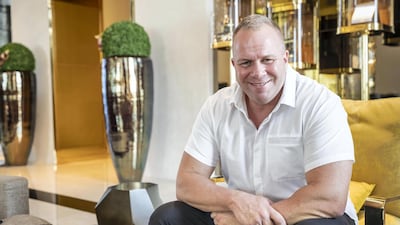Jordan's Fine Hygienic Holding is considering an initial public offering on the London Stock Exchange as early as next year as the company looks to expand in new markets and invest about $100 million (Dh367m) to set up its sixth paper mill in the Mena region, its chief executive said.
Fine has already done "a bit of a preparation" for its IPO but is yet to decide how much of a stake it will sell in the public offering, James Lafferty told The National.
The company plans to surpass its target of $75m in earnings before interest, tax, depreciation and amortisation (Ebitda) this year, an important milestone for its listing plans, Mr Lafferty said.
“The big target is the IPO … the earliest is 2021. The original target was 2022 but we are seeing if it can come forward. Once you go over $75m [in Ebitda] then you can start to get serious [about the deal],” Mr Lafferty said.
He said that timing and market sentiment will be critical. Fine has yet to engage investment banks on the potential IPO.
Companies from the Middle East are increasingly looking to list shares in London amid lacklustre trading on local markets.
The LSE is home to UAE payment provider Network International, foreign exchange company Finablr and Jordan's Hikma pharmaceutical company.
Shares of Abu Dhabi’s NMC Health and Gulf Marine Services also trade in London.
Founded in 1958, Fine is majority-owned by Jordan’s Nuqul Group.
In 2015, Standard Chartered Private Equity led a consortium of companies that bought a minority stake in the company for $175m.
The company is approaching $1 billion in annual sales and registered double-digit growth in revenue over the past two years, Mr Lafferty said.
He said Fine's bottom line grew 50 per cent year on year over the same period but declined to give the annual profit figure.
Fine, which already owns two paper mills each in Jordan and Egypt and one in Abu Dhabi, is considering plans for a sixth unit either in Saudi Arabia, Egypt or the UAE.
The project is being studied and Fine is already in talks with the companies that specialise in building paper mills.
Al Nakheel, its Abu Dhabi unit, was set up with an investment of $91m in 2017.
“We are totally sold out on capacity. Everything we make, we sell and we are pushed to the limit,” he said. “You have to start thinking ahead of the time as paper mills cost about $100m so it’s a big investment ... lead times are also 18 to 24 months.”
The company, which has pivoted into wellness and hygiene, spent $10m to acquire a 30 per cent stake in natural food and beverage company Nai Arabia last October, becoming its largest single shareholder.
Fine is looking at two more potential acquisitions in the Mena region, Mr Lafferty said, but declined to name the companies.
The size of investment depends on the stake Fine decides to buy, but the company usually aims for deals with a ticket size of between $10m and $50m.
The two potential deals – still at due-diligence stage – are in that range, Mr Lafferty said .
Though Fine is present in 75 markets across the world and primarily focuses on its core markets in Mena, it has set its sights on Pakistan and Liberia.
“These are the only two strategic entry markets right now ... where we are going all the way. We put people in, set up a company, we look at manufacturing, we invest in marketing ... [and] we invest big in the first year,” he said.
In the Mena region, Mr Lafferty plans to consolidate the company’s presence and increase its market share over the coming two years in the UAE, which is about 20 per cent.
Fine has an average 30 per cent market share across the Mena region..
"We want to build our market share in every market as we are never happy with it … a huge focus for us is the UAE as the results here are not as strong as other markets," Mr Lafferty said
In January, Fine branched out into manufacturing of face masks with Swiss-patented "livinguard" technology.
The demand for the company’s virus and bacteria-resistant product has surged in the wake of the coronavirus outbreak globally.
It has so far received sales enquiries for 20 million masks from more than 100 countries, with firm orders topping two million masks, he said.
“People want these masks and there is a mismatch between the production capacity and demand,” Mr Lafferty said.
The company has now turned to contract manufacturing to fulfill orders.
“We are looking to make more as the UAE market is completely under-served and we run out of stock every other day.”


